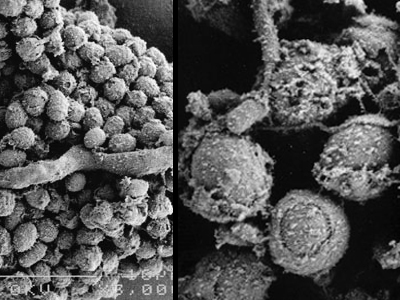What You Should Know About Mold
Understanding Mold
•Mold is usually everywhere – in the air and on the surface of objects.
•Mold puts out showers of millions of spores into the air.
•It is present during all seasons, but more so in Spring and Fall.
•Floating particles of mold are invisible to the naked eye.
•Loose mold particles that accumulate on objects in your home are easily inhaled and are a grave threat to the health of your family and pets.
•The toxic mold we hear most about is ‘Stachybotrys chartarum,’ a slimy, greenish-black mold that grows on moisture-laden materials that contain cellulose, such as wood, paper and drywall.
•Even non toxic mold destroys organic material it grows on.
•Even non toxic mold starts emitting smell and degrades the quality of the air around you considerably.
Mold and Your Home
Mold can enter your home through open doorways, windows, vents, and heating and air conditioning systems.
Mold from the air outside can attach itself to your clothing, shoes, bags, and pets, and be carried indoors.
Mold will grow in places with a lot of moisture, such as around leaks in roofs, windows, or pipes, or where there has been flooding.
Mold grows easily on paper products, cardboard, ceiling tiles and wood.
Mold also grows in dust, paints, wallpaper, insulation, drywall, carpet, fabric and upholstery.
Mold and Your Health
•The huge health hazards of mold are often underestimated.
•Mold releases toxins called ‘mycotoxins’, which can be as dangerous as chemicals like formaldehyde, toluene, natural gas and trichloethylene.
•These toxins can even initiate cancers, cause chemical sensitivity and just about any symptom you can think of.
Some Symptoms & Conditions Caused by Mold Exposure Include:
Allergic Rhinitis
Sinusitis
Asthma
Shortness of Breath
Emphysema
Rashes
Hives
Eczema
Dermatitis
Hypertension
Migraine and Headaches
Inability to Concentrate
Irritability
Confusion
Dizziness
Depression
Obsessive Compulsive Behavior
Panic / Anxiety Attacks
Tourette’s Syndrome
Schizophrenia
Chronic Fatigue and Weakness
Algias
Burning Eyes
Arthritis
Lowered IQ
Chest Pain
Hyperactivity
Symptoms attributed to MS
Heart Palpitations
Cravings for sweets or carbohydrates
Gastrointestinal Distress such as Irritable Bowel, Indigestion, Heartburn
Besides these, there are many other symptoms that have been attributed to mold toxicity, including death.
By preventing even mild mold growth in your living environment, you can reduce the chance of these symptoms occurring and improve the overall health of your family.
If you think your property might have mold, please schedule it to be evaluated by our certified professionals.






